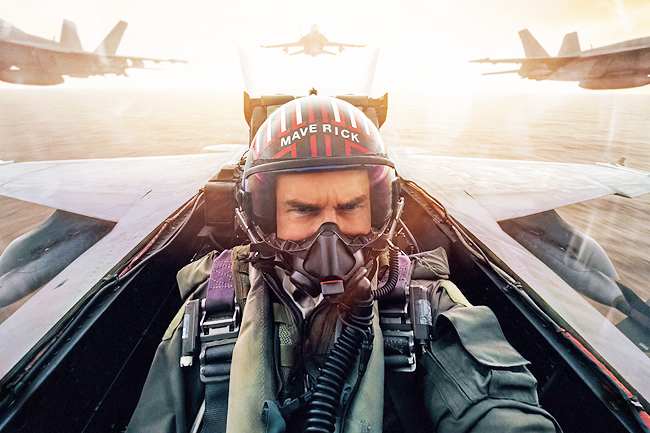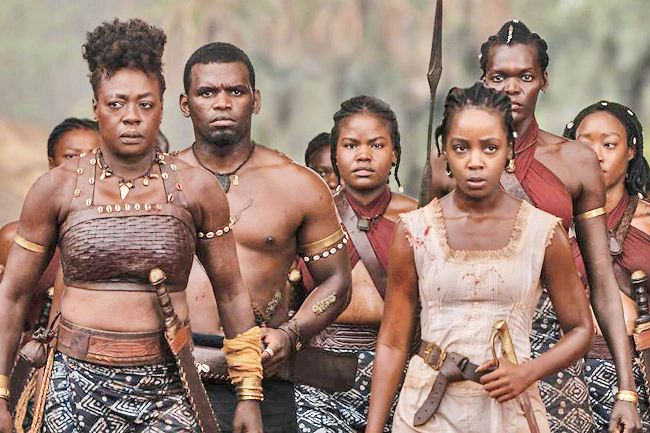Ann Hornaday
THE WASHINGTON POST – The movies are back! Aren’t they? If 2022 proved anything, it’s that superheroes and spectacles can still pack audiences into theatres. As for the rest… they’re out there, albeit fewer and farther between.
The best news is how many first-time filmmakers appeared on the scene. with such promising debuts as Vengeance (directed by BJ Novak), Emily the Criminal (John Patton Ford), Nanny (Nikyatu Jusu), Emergency (Carey Williams) and You Resemble Me (Dina Amer). The future looks bright, on big screens and small.
TOP GUN: MAVERICK
When it came to this decades-in-the-making sequel, I was as skeptical as the next snooty cinéaste – if only because the original couldn’t possibly have aged that well. (It didn’t age well a week after it opened in 1986). But Tom Cruise did it again, disarming everyone’s defences in a big, old-fashioned movie-movie that outclassed the first movie in its smart writing, canny casting, authentic emotion (still crying, Iceman) and bold, beautiful production values. A blockbuster in the best sense of the word.
TÁR
Cate Blanchett brought sinewy, sensuous ferocity to her performance as the title character, a gifted and obsessive orchestra conductor who’s brought low by allegations from her past.
Writer-director Todd Field imbues the hushed world of classical music with rank ambition and sweaty desperation, as he engages timely questions about power, artistic ego, accountability and evolving ideas about canonical coronation. It’s all there, both in Blanchett’s fearless performance and an overarching production that’s just as rigorously observant as Tár herself.



GOOD LUCK TO YOU, LEO GRANDE
Emma Thompson plays a widow eager to jump-start her dormant life; Daryl McCormack makes a confident, screen debut as the younger man she hires to help. Successive scenes of two people talking in a might not sound like thrilling cinema, but director Sophie Hyde makes it exciting, simply by allowing two fabulous actors explore each other in real time, with humour and dignity. McCormack is a revelation; Thompson, as usual, is her own incandescent special effect.
SHE SAID
Carey Mulligan and Zoe Kazan play Megan Twohey and Jodi Kantor, the New York Times reporters who broke the story of Harvey Weinstein’s serial harassment and abuse of actresses and assistants. This dramatisation gains its power, not from spy-movie tropes or late-night revelations, but from the sheer emotional force of women finally telling their truths. The film’s most profound moments belong to Samantha Morton, Jennifer Ehle and Ashley Judd – who plays herself as she agonises over whether to go on the record. The rest is herstory.
ARMAGEDDON TIME
James Gray eschews the usual portrait-of-the-artist narrative of creative discovery to dig into how growing up in Queens in the 1980s forced him to confront confusing but essential realities about race, identity and privilege. Anne Hathaway and Jeremy Strong run suitably hot and cold as Gray’s loving but deeply flawed parents; Anthony Hopkins plays the grandfather who encourages him to stand up for what’s right, even when it hurts. An all-too-rare examination of Whiteness, in the hands of a warm and humane storyteller.
THE WOMAN KING
In this historical drama, director Gina Prince-Bythewood brought her considerable action chops to bear on a story about real-life 19th-Century female African warriors, giving them a mythic gloss that some critics considered deceivingly revisionist. Seen beside such inspirations as Braveheart and Gladiator, this action-drama holds up, not just because of the pulse-quickening fight scenes, but also because of Viola Davis’ fierce, solidly grounded portrayal of a woman facing her past while reconsidering her future as a fighter.
TRIANGLE OF SADNESS
With such films as Force Majeur and The Square, Swedish filmmaker Ruben Östlund has emerged as one of our keenest social satirists. Triangle of Sadness, his first English-language film, skewers obscene class inequality by way of a yacht that is out to sea – geographically and morally. Woody Harrelson delivers an unforgettable performance as a ship captain whose anti-capitalist rants soar to aria-like heights. Dolly De Leon steals the movie in its topsy-turvy third act, when the social currencies of beauty, wealth and power are all up for grabs.
THREE MINUTES: A LENGTHENING
Filmmaker Bianca Stigter adapts Glenn Kurtz’s memoir of his grandfather’s home movie taken in Poland in 1938, creating a mesmerising filmic essay on history, the power of place and the granular specificity that it takes for true restoration to occur, whether it be on celluloid or collective memory. This deep dive into an almost-forgotten fragment is given added depth by Helena Bonham-Carter’s expressive narration.
AFTERSUN
Writer-director Charlotte Wells made an astonishing debut with this impressionistic memoir about a little girl (Frankie Corio) taking a Turkish vacation with her dad (Paul Mescal). Their time together unfolds with a combination of boredom and tension, as the parameters of their relationship take hazy shape. Wells captures the vagrant, elliptical nature of recollection, and her casting is spot on: Mescal’s performance is ingratiating yet melancholy, and Corio is quite simply stunning in one of the bravest turns of the year.
THE MARTHA MITCHELL EFFECT
Technically, this examination of one of Watergate’s most misunderstood figures qualifies as a short film. But in the hands of directors Anne Alvergue and Debra McClutchy, 40 minutes feels far meatier and more meaningful than most two-and-a-half-hour yawn fests.
Mitchell was made a laughingstock in the 1970s, when she defied the Richard M Nixon and her own husband, former attorney general John Mitchell, to tell the world what she knew.
The filmmakers perform long-overdue reputational repairs with a film that’s infuriating and moving in equal measure.






